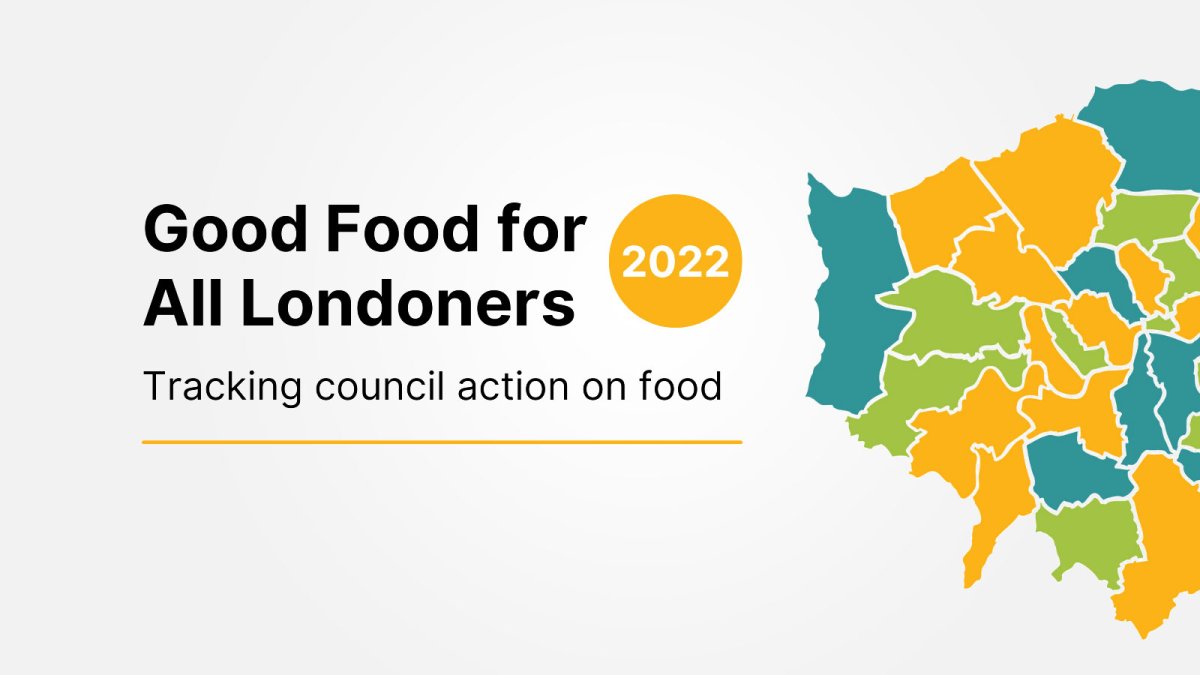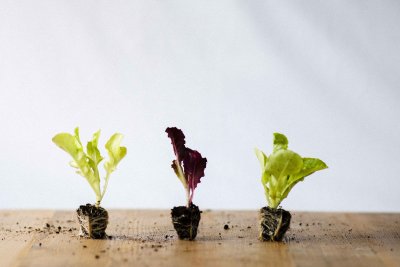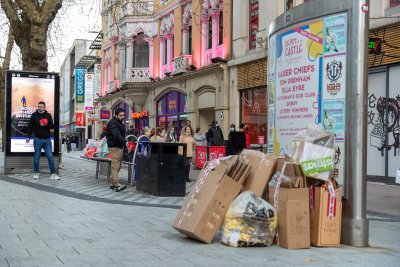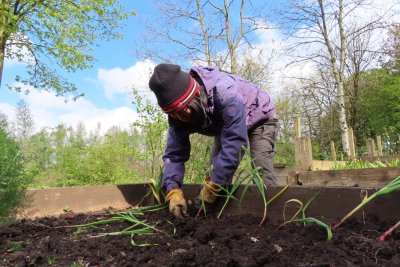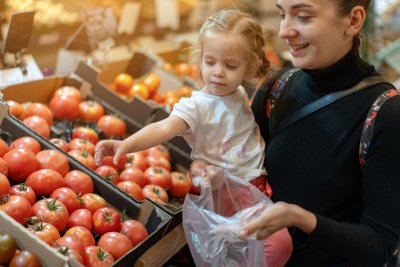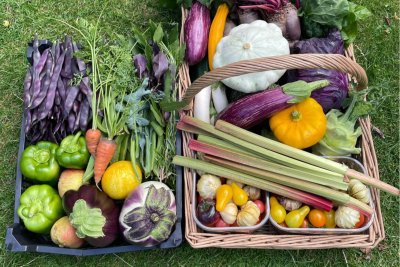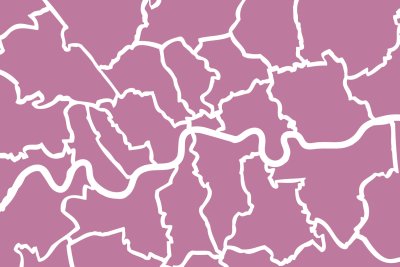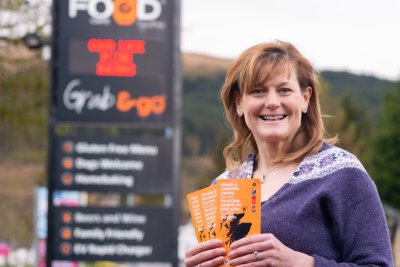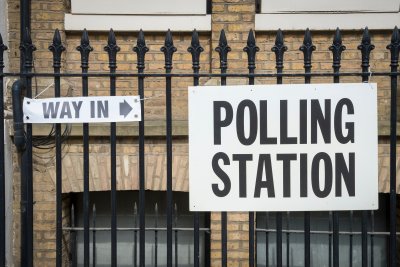This year’s Good Food for All Londoners report shows more Londoners have access to affordable, healthy and sustainable food as London councils step up in challenging times. Following the impact of Covid-19 and the cost-of-living crisis, the new report published by London Food Link, part of food and farming charity Sustain, found London councils are better supporting residents and local food enterprises, boosting services for the most vulnerable and getting ready for the roll-out of universal free school meal provision for all primary school children across London.
The independent Good Food for All Londoners report reviews council action on food under two key themes: tackling the root causes of food poverty and supporting residents to buy and eat affordable, healthy and climate-friendly food. Pressing issues measured in the report include how councils tackle household food insecurity, promote of healthy diets, support a flourishing local food economy, and address the role of food in the climate and nature emergency. All of these affect the way we eat, our health and the communities we live in.
From the 28 councils who took part in this year’s survey (out of the 33 councils in London), responses show promising progress on several themes relating to food, with overall scores increasing from last year. Four councils stand out as cross-cutting leaders: Islington, Lambeth, Southwark and Tower Hamlets. These scored highest in both key themes of the report.
Food Poverty – Beyond the Food Bank
Many Londoners are struggling to access the food they need, and councils are employing several techniques to support residents. As well as the cross-cutting leaders (above), Newham and Camden achieved overall leadership in the Beyond the Food Bank section by providing strong support across multiple actions.
Across London, councils are generally prioritising cash-first approaches to help Londoners maximise their incomes and families access the food that is right for them in a dignified manner, with 13 councils showing leadership and 13 showing good practice in this area. There has been welcome progress on children’s food this year including Healthy Start vouchers promotion and the provision of food during the school holidays, with 17 councils leading in this area, and Westminster joining Islington, Newham, Southwark and Tower Hamlets in providing universal free school meals to primary school children.
Committing to pay the London Living Wage is an important cash-first approach which 26 councils are undertaking, with Islington, Newham, and Southwark leading by having Living Wage Places in the borough. Prioritising residents at high risk of malnutrition and food insecurity including older and disabled adults is necessary, and significant progress has been made in this area with 11 councils now funding meals on wheels services to support people who struggle to prepare food for themselves.
Good Food for London
As well as the cross-cutting leaders (above), Greenwich and Waltham Forest achieved overall leadership in the Good Food for London section of the report, with strong work on promoting healthy and sustainable food while investing in the local food economy and supporting residents to grow their own.
Some councils in London report taking a joined-up approach to create a healthier, more sustainable, and equitable food system by having an active food partnership, demonstrating the strength of the good food movement in the city, with many councils having either published a food strategy this year or being in the process of writing one. This work is welcome and important, as the report highlights that councils with food partnerships tend to perform better across all metrics, with the two leaders in the ‘joined-up action’ theme, Islington and Tower Hamlets, achieving cross-cutting leadership.
Good progress has also been made in strengthening the local food economy, with seven councils showing leadership and 11 showing good practice, in areas such as offering training and financial support to small food businesses, markets and the local voluntary sector.
Eight councils are demonstrating leadership in how they are supporting communities to access land for food growing, twice as many as last year, with progress made on areas such as policy, mapping of land and inclusivity of access. The report also shows which boroughs are finding creative ways to address the climate and nature emergency through food, including serving sustainable meals in schools and taking action on food procurement and food waste, with nine councils (three times as many as last year) achieving leadership for their work on food and climate change.
However, the results suggest there is more to be done to champion food for better health and action on climate change, and the need for renewed focus on achieving healthier diets, with only four councils having a Healthier Food Advertising policy in place. There has also been a reduction in active food poverty alliances and up-to-date food poverty action plans to help people on a low income. Despite the welcome focus on this area, there were fewer direct cash-first actions reported. Councils are urged to prioritise these areas, especially during the cost-of-living crisis, to maintain momentum on progress made and prevent the widening of gaps in health equity.
Councillor Vicky Ashworth, Lead Member for Jobs, Social Inclusion and Equalities at Waltham Forest Council says:
“Over the last year, Waltham Forest Council has been hard at work with our community partners to develop a new approach to food insecurity that will give every resident access to healthy, affordable and culturally appropriate food. We are really pleased to be moving into a Leadership position in this year's Good Food for All Londoners report, which spotlights some of our most innovative initiatives including Black Breastfeeding Week, Food Growing and Green School meals.”
“We know how challenging the recent cost of living crisis has been for our residents and we will continue working together with our partners to ensure that every Waltham Forest residents has the food they need to thrive.”
Cllr Aicha Less, Deputy Leader and Cabinet Member for Communities Public Protection and Licensing , Westminster Council, said:
“This report makes me proud to see how much improvement we have made in ensuring Westminster residents have access to healthy and affordable food. The report enables us to benchmark ourselves with London councils and work to improve the food provision for residents.”
''The cost of living has hit Westminster hard with a quarter of the city now classed as vulnerable. But initiatives such as our food banks, community pantries and free school meal provision for children aged three to 14, offer much needed support.”
We will continue to work with partners to celebrate what Westminster has to offer whilst helping those who need it most.”
Kath Dalmeny, Chief Executive at Sustain said:
“London’s councils have a critically important role to play in ensuring that all Londoners can eat well Where access to healthy and sustainable food is prioritised, our city is prosperous, green and thriving. Community gardens flourish, children and older people are well fed, and money flows to local food enterprises, building economic resilience.”
“The Good Food for All Londoners report shows what can be achieved when we set our hearts, minds and policies to achieving a better food system. It is now our duty to make this work for everybody, not just for those in boroughs showing leadership.”
Ruth Westcott, climate and nature emergency coordinator at Sustain adds:
“A number of London councils have been doing great things to reduce emissions from food for a number of years now. But it feels like we are at a turning point this year, and that’s thanks to councils coming together to create a London-wide commitment to make the food they control reflect a planetary health diet. It’s really exciting and we look forward to celebrating councils putting this into practice.”
Find out how your council fared in the Good Food for All Londoners report. Measures include food poverty alliances, cash-first approaches, children’s food and our approach to the cost-of-living crisis, as well as joined-up action on food, healthier food environments, good food economy, food growing and climate-friendly food.
Read the full report today
Also available to read now is the report's foreword by Professor Kevin Fenton and Dr. Tom Coffey as they paint the picture of food in London in 2022.
The Beyond the Food Bank theme of the Good Food for All Londoners report is funded by Trust for London, which funds works that looks to address the root causes of poverty and inequality in London. They want to support work that helps better understand the systemic causes of London’s social problems; activities that help people improve their lives; and work empowering Londoners to influence and change policy, practice and public attitudes. The Sustain alliance (a registered charity) also receives support from the Mayor of London and Greater London Authority for this work, as well as contributing ourselves to the funding, staffing and activities through our London Food Link network. Partners also contribute expertise and staff time.
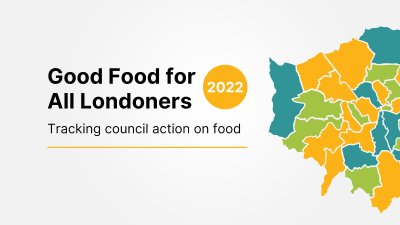 Good Food for All Londoners 2022. Credit:
Good Food for All Londoners 2022. Credit: 